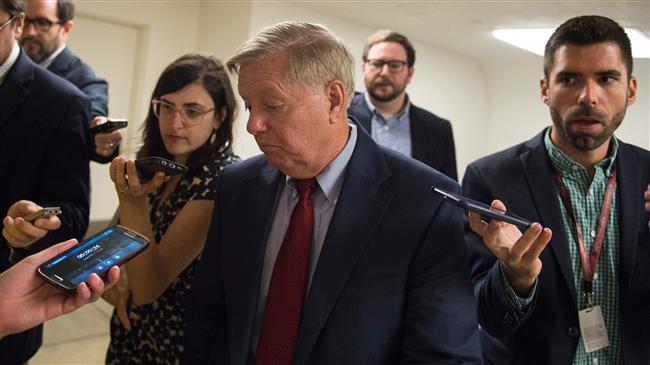US senators introduce ‘crushing’ new sanctions against Russia
US senators from both the Republican and Democratic Party have introduced legislation to impose “crushing” new sanctions on Russia to punish Moscow over alleged interference in US elections and its activities in Syria and Ukraine.
The measure, which was introduced on Thursday, would have to pass both the Senate and House of Representatives and be signed by US President Donald Trump to become law. The prospects of the latest bill were not immediately clear.
The bill includes restrictions on new Russian sovereign debt transactions, energy and oil projects and Russian uranium imports, and new sanctions on Russian political figures and oligarchs.
Republican and Democrat lawmakers in Congress united last month in repudiating Trump’s failure to publicly condemn Russian President Vladimir Putin for interfering in the 2016 US elections.
Senator Lindsey Graham, a Republican of South Carolina, said in a statement Thursday the senators’ goal is to "impose crushing sanctions and other measures against Putin’s Russia until he ceases and desists meddling in the US electoral process," as well as stop cyber attacks and remove Russia from Ukraine and Syria.
“The current sanctions regime has failed to deter Russia from meddling in the upcoming 2018 midterm elections,” Graham said.
Graham, a known war hawk and one of the measure’s lead sponsors, told reporters earlier this week that he planned a “sanctions bill from hell” to punish Russia.
The measure comes amid reports by US officials of Russia’s ongoing efforts to interfere in US elections and new efforts to hack US senators.
Senior intelligence and national security officials in the Trump administration claimed Thursday that Russia is behind “pervasive and ongoing” attempts to influence upcoming US elections, a threat Trump has repeatedly dismissed and played down.
Congress passed a Russia sanctions bill last summer but some lawmakers chafed at what they saw as Trump’s reluctance to implement it; he signed it only after Congress passed it with huge majorities.
Trump has repeatedly denied allegations that his campaign colluded with Moscow and has condemned the ongoing US federal investigations over the alleged meddling, drawing accusations from Democratic and Republican Party lawmakers alike that he is ignoring a threat to American democracy.
VIDEO | Yemeni forces repel US-British attack, down F-18 Jet
Iran’s capabilities vast; enemy’s ‘maximum pressure’ policies all failed miserably: Senior official
Iran’s economy grew 2.7% y/y in Sep quarter: CBI
VIDEO | Freelancers in Gaza strive to stay online amid genocide
Mikati demands Israel's withdrawal from south Lebanon
Yemeni army strikes Israeli military sites with drones
‘Clock ticking’: UNRWA slams unjustifiable killing of children in Gaza
BP to be sued in Britain for supplying oil to Israel











 This makes it easy to access the Press TV website
This makes it easy to access the Press TV website